Advent: Remaining Vigilant in Love
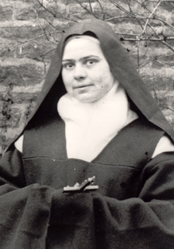 The season of Advent invites us to remain alert for the coming of the Lord. He comes at Christmas, and He will come at the end of times. Between these two appearances, we prepare the way for Him in anticipation of His arrival.
The season of Advent invites us to remain alert for the coming of the Lord. He comes at Christmas, and He will come at the end of times. Between these two appearances, we prepare the way for Him in anticipation of His arrival.
Elisabeth who loved to remain “completely absorbed in her faith” lived this anticipation of the Lord with a special intensity. To assist us in deeply living this liturgical time of year, she invites us to do three things
Awaiting with the love of Mary
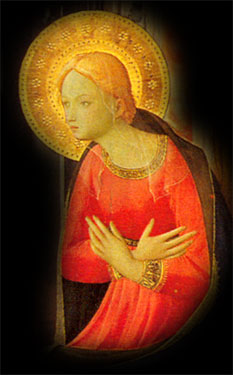 According to Elisabeth, the Virgin Mary is the one from whom we learn to wait and to love Jesus. In a letter to her sister, Guite, just before Advent 1903, Elisabeth writes:
According to Elisabeth, the Virgin Mary is the one from whom we learn to wait and to love Jesus. In a letter to her sister, Guite, just before Advent 1903, Elisabeth writes:
« Think what must have been in the soul of the Virgin when, after the Incarnation, she possessed within her the Incarnate Word, the Gift of God...In what silence, what recollection, what adoration she must have been wrapped in the depth of her soul in order to embrace this God whose Mother she was. My little Guite, He is in us. Oh! let us keep very close to Him, in that silence, with that love of the Virgin; let us spend our Advent like that, shall we? »
Letter 183, 11. 22.1903
Elisabeth speaks this way to her sister because Guite is expecting her first child. Guite is in the same situation as the Virgin Mary who was expecting her first born Son. Elisabeth bases her statement on Guite’s maternal experience to help her understand how she can live the approaching Advent Season: God is in her, in us.
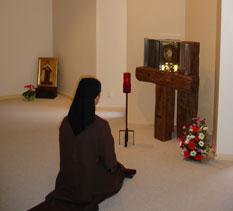 To meet Him, just as Mary did, she must become silent, enter within herself and become attentive to a Presence which she can only grasp with a lively faith. Guite who had felt an awakening of love in her for “the little being who is already in the thought of God,” and of which she perceives the presence without however, already having taken the child in her arms. Thus, she has a presentiment of the love the Virgin felt toward the Word made flesh in her. Taking into account the maternal expectation of her sister, and moved with her in this anticipation, Elisabeth invites her to enter deeper into Christian life: to live in the presence of God in all the richness of her humanity.
To meet Him, just as Mary did, she must become silent, enter within herself and become attentive to a Presence which she can only grasp with a lively faith. Guite who had felt an awakening of love in her for “the little being who is already in the thought of God,” and of which she perceives the presence without however, already having taken the child in her arms. Thus, she has a presentiment of the love the Virgin felt toward the Word made flesh in her. Taking into account the maternal expectation of her sister, and moved with her in this anticipation, Elisabeth invites her to enter deeper into Christian life: to live in the presence of God in all the richness of her humanity.
Living in the Depth
 In her prayer, Elisabeth asks the Holy Spirit: “Come upon me and create in my soul a kind of incarnation of the Word”... For a long while, she had learned from Mary how to live with God. A few weeks before dying, she looks at her again. In her last retreat, August of 1906, she writes:
In her prayer, Elisabeth asks the Holy Spirit: “Come upon me and create in my soul a kind of incarnation of the Word”... For a long while, she had learned from Mary how to live with God. A few weeks before dying, she looks at her again. In her last retreat, August of 1906, she writes:
« The Virgin kept all these things in her heart”: her whole history can be summed up in these few words! It was within her heart that she lived, and at such a depth that no human eye can follow her. When I read in the gospel “that Mary went in haste to the hill country of Judea” to perform her loving service for her cousin Elisabeth, I imagine her passing by so beautiful, so calm and so majestic, so absorbed in recollection of the Word of God within her. Like Him, her prayer was always this: “Ecce, here I am!” Who? “The servant of the Lord”, the lowliest of His creatures: she, His Mother! Her humility was so real for she was always forgetful, unaware, freed from self. And she could sing: “The Almighty has done great things for me, henceforth all peoples will call me blessed. »
Last retreat, fifteen day
 This attitude of Mary’s was that which Elisabeth wanted too, because it is the Christian attitude par excellence. To live in the depths does not mean to be isolated from human realities. On the contrary, it is to desire and accomplish the Will of God in all things, and not let ourselves be distracted from that. This Christian life is also a Christian responsibility in that it prepares the world for the coming of the Lord.
This attitude of Mary’s was that which Elisabeth wanted too, because it is the Christian attitude par excellence. To live in the depths does not mean to be isolated from human realities. On the contrary, it is to desire and accomplish the Will of God in all things, and not let ourselves be distracted from that. This Christian life is also a Christian responsibility in that it prepares the world for the coming of the Lord.
Elisabeth confides to Father Chevignard, the brother-in-law of her sister Guite:
« I love this thought, that the life of the priest (and the Carmelite) is an Advent that prepares for the Incarnation in souls. In one psalm, David sings that “fire goes before the Lord”. Isn’t fire love? And isn’t our mission also to prepare the way of the Lord through our union with Him whom the Apostle calls a “consuming fire”? At His touch our soul will become like a flame of love spreading into all the members of the body of Christ, the Church; then we will console the Heart of our Master, who, showing us to the Father, will be able to say: “ I am already glorified in them. »
Letter 250, November 1905
Waiting in the name of all
What Elisabeth applies to the priest and the Carmelite is intrinsically true for all christians. It is why the wait, the hope of all christians is not limited to this liturgical time. However, Advent is an invitation to renew our awareness of this wait and hope. It specifies an attitude that Elisabeth describes in a letter to Father Chevignard which precedes the above citation:
« The holy time of Advent is here; it seems to me that this is especially the season of interior souls, those who live unceasingly and through everything wholly “hidden with Christ in God” at the center of themselves. In expectation of the great mystery, I love to go deeply into that beautiful psalm XVIII, which we often say at Matins, and particularly these verses: “There he has placed his tent in the sun, and this star comes forth like a bridegroom coming from his bed, rejoices like a champion to run its course. At the end of the sky is the rising of the sun; to the furthest end of the sky is its course; nothing is concealed from its burning heat”. Let us empty our soul so He can come forth in it and communicate the eternal life that is its own; the Father has given Him “power over all flesh” for that purpose, as we are told in the Gospel. And then in the silence of prayer, let us listen to Him, for He is the “Source” who speaks within us and who has said: “He who sent me is true, and I tell all I have heard from Him”. Let us ask Him to make us true in our love, to make us sacrificial beings, for it seems to me that sacrifice is only love put into action: “He loved me, He gave Himself for me. »
Letter 250, November 1905
We are called to prepare the ways of the Lord in the world by continuously surrendering ourselves to the One who is to come. This is what Elisabeth did, becoming a source of hope for the world. She does not cease to draw us on this path, fulfilling her mission: “to draw souls by helping them go out of themselves to cling to God by a simple, loving movement, and to keep them in this great silence within that will allow God to communicate Himself to them and transform them into Himself”. This mission announces the Good News of “God with us”, Emmanuel, to all those who wait for salvation.

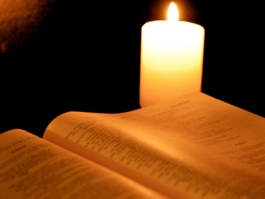 "We know and rely on the love God has for us."
"We know and rely on the love God has for us."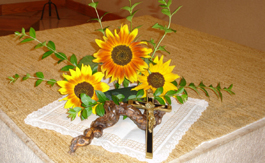 "When Christ came into the world, he said: ‘Sacrifice and offering you did not desire, but a body you prepared for me; with burnt offerings and sin offerings you were not pleased. Then I said, “Here I am – it is written about me in the scroll – I have come to do your will, my God."
"When Christ came into the world, he said: ‘Sacrifice and offering you did not desire, but a body you prepared for me; with burnt offerings and sin offerings you were not pleased. Then I said, “Here I am – it is written about me in the scroll – I have come to do your will, my God."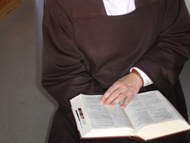 "The end of all things is near. Therefore be alert and of sober mind so that you may pray. Above all, love each other deeply, because love covers over a multitude of sins. Offer hospitality to one another without grumbling."
"The end of all things is near. Therefore be alert and of sober mind so that you may pray. Above all, love each other deeply, because love covers over a multitude of sins. Offer hospitality to one another without grumbling."